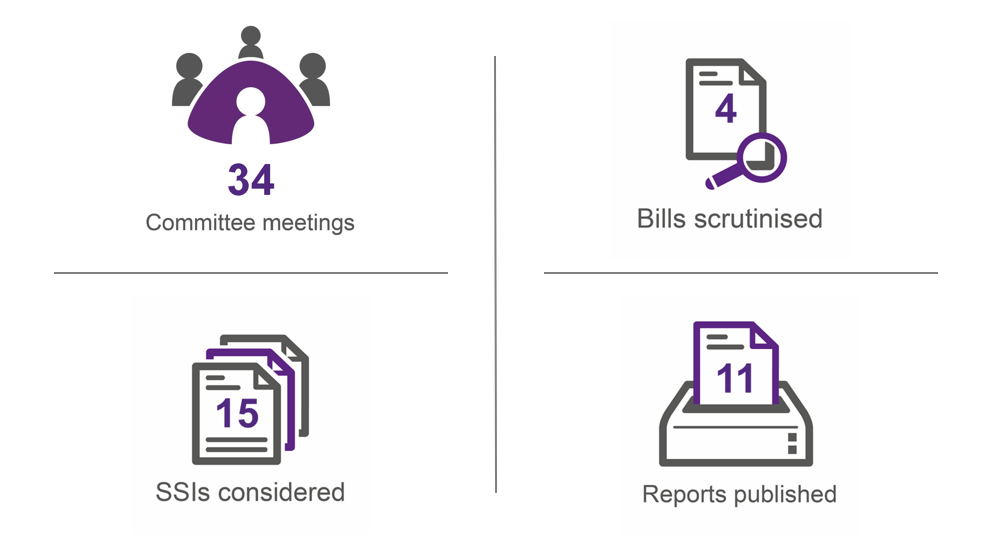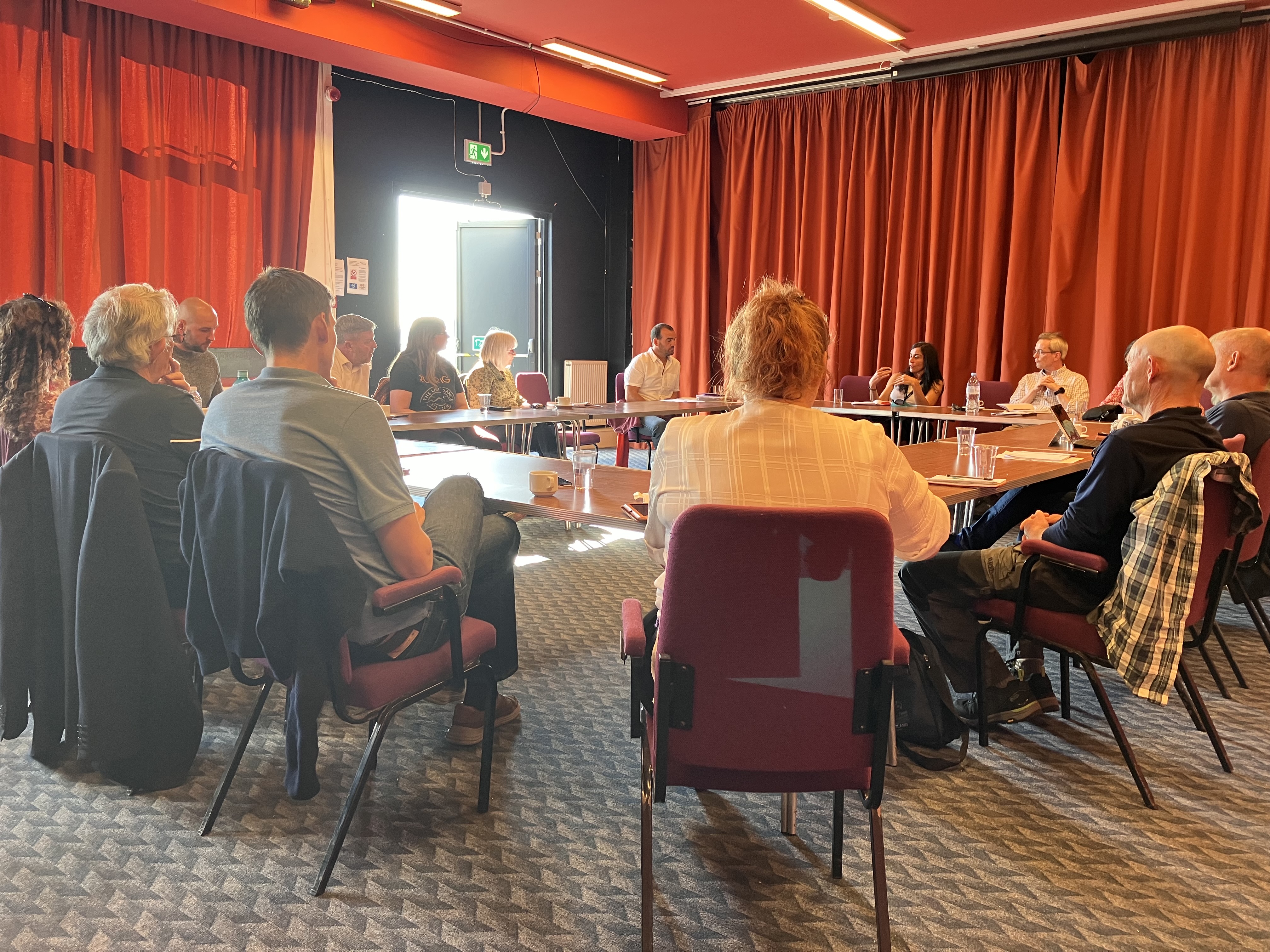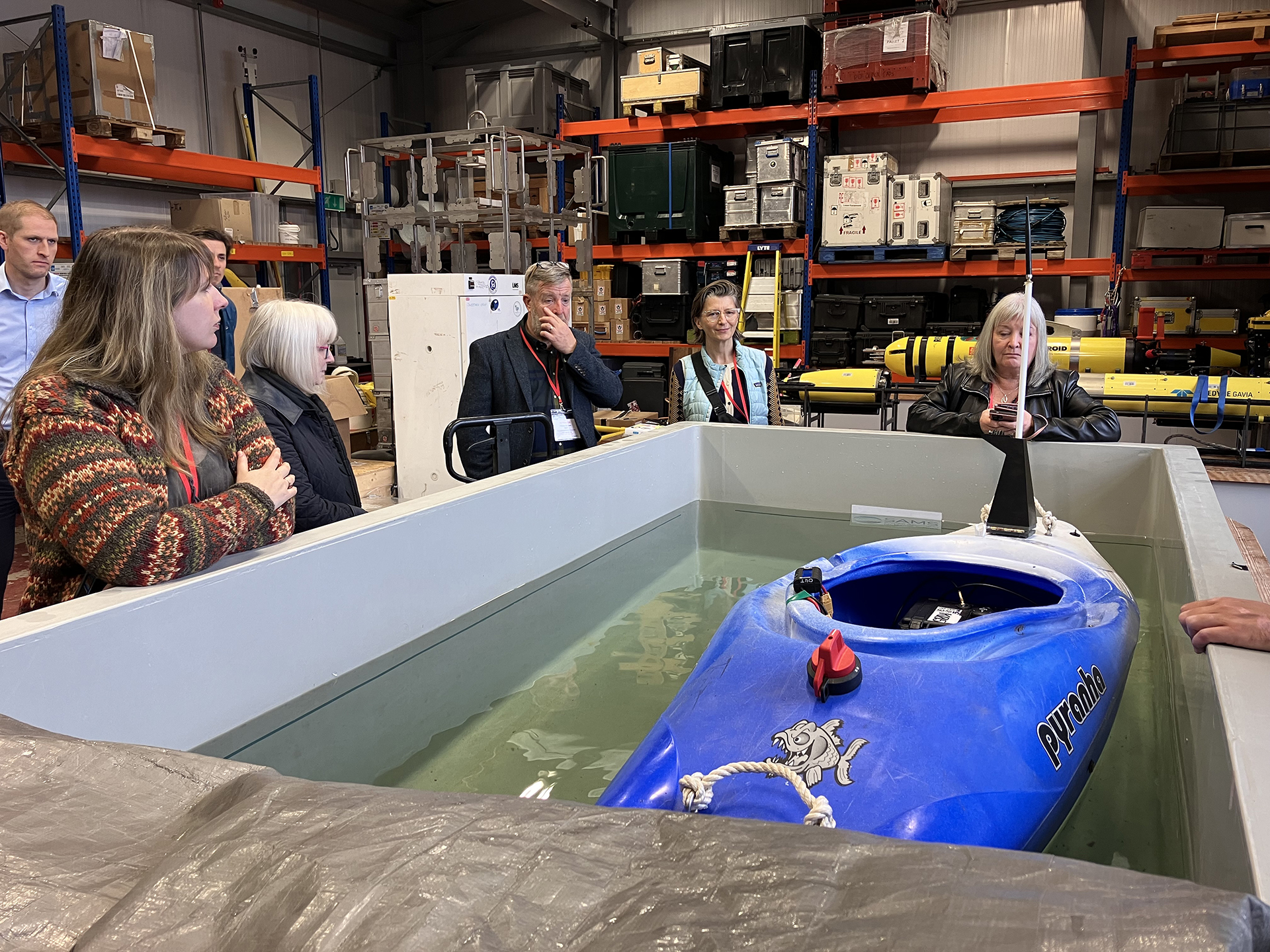Rural Affairs and Islands Committee
Annual report of the Rural Affairs and Islands Committee 2024-25
Introduction
This report outlines the work of the Rural Affairs and Islands Committee during the parliamentary year from 13 May 2024 to 12 May 2025.
The Committee's remit is to consider and report on matters falling within the responsibility of the Cabinet Secretary for Rural Affairs, Land Reform and Islands, with the exception of matters relating to land reform, natural resources and peatland, Scottish Land Commission, Crown Estate Scotland, and Royal Botanic Garden.

Membership changes
The following changes to the Committee's membership occurred during this parliamentary year—
Members:
Emma Roddick joined the Committee on 14 May 2024 (replacing Kate Forbes who left in the previous parliamentary year, on 10 May 2024).
Alasdair Allan resigned from the Committee on 17 June 2024 and was replaced by Colin Beattie (18 June 2024 to 20 January 2025)
Rachael Hamilton resigned from the Committee on 10 October 2024 and was replaced by Tim Eagle (10 October to date)
Colin Beattie resigned from the Committee on 20 January 2025 and was replaced by Evelyn Tweed (22 January 2025 to date)
Ariane Burgess resigned from the Committee on 29 April 2025 and was replaced by Mark Ruskell (29 April to date).
Substitute members:
Karen Adam was replaced by Christine Grahame (18 September 2024 to date)
Mercedes Villalba was replaced by Daniel Johnson (25 September 2024 to date)
Jamie Halcro Johnston resigned as substitute on 10 October 2024 and was replaced by Brian Whittle (6 November 2024 to date)
Mark Ruskell was replaced by Ariane Burgess (29 April 2025 to date)
Meetings
The Committee met 34 times during the reporting period. Of these meetings, four were held entirely in private and 26 meetings included at least one item taken in private. Four meetings were held entirely in public. The reasons for taking business in private were to consider—
the Committee's work programme;
draft reports;
evidence gathered through calls for views; and
the evidence heard during committee meetings.
Legislation
This section covers the Committee's scrutiny of primary legislation and subordinate legislation.
Welfare of Dogs (Scotland) Bill
The Welfare of Dogs (Scotland) Bill was introduced in the previous parliamentary year, on 20 June 2023, and was referred to the Committee for consideration at Stage 1.
The Bill aimed to improve the health and wellbeing of dogs throughout their lives by establishing a more responsible and informed approach to acquiring and owning a dog and by making provision for regulating the sale or transfer of puppies from unlicensed litters.
The Committee considered the Bill at Stage 2 on 18 September 2024. Following the Stage 3 debate on 23 January 2025, the Bill passed by a vote of 114 for, zero against and zero abstentions. The Bill became an Act on 19 March 2025.
Agriculture and Rural Communities (Scotland) Bill
The Agriculture and Rural Communities (Scotland) Bill was introduced in the previous parliamentary year, on 28 September 2023, and referred to the Committee for consideration at Stage 1.
The Bill made provision for the Scottish Government to provide agricultural support.
The Committee concluded its consideration of the Bill at Stage 2 at its meeting on 15 May 2024. Following the Stage 3 debate on 18 June 2024, the Bill passed by a vote of 115 for, zero against and zero abstentions. The Bill became an Act on 30 July 2024.
Dog Theft (Scotland) Bill
The Dog Theft (Scotland) Bill was introduced by Maurice Golden MSP on 17 February 2025 and referred to the Committee for consideration at Stage 1..
The purpose of the Bill is to make dog theft a statutory offence. The Bill also includes other provisions relating to dog theft and the proposed offence.
Following the introduction of the Bill, the Committee held a roundtable discussion with key stakeholders on 26 March 2025 and an evidence session with the Minister for Victims and Community Safety on 23 April 2025.
The Committee will take evidence from the member in charge of the Bill, and publish its Stage 1 report, in the next reporting period.
Natural Environment (Scotland) Bill
The Natural Environment (Scotland) Bill was introduced on 19 February 2025 and referred to the Committee for consideration at Stage 1.
The Bill makes provision to give the Scottish Ministers the power to set statutory biodiversity targets (part 1) and the power to make regulations to modify or restate environmental impact assessment legislation and habitats regulations (part 2); to make changes to national park legislation (part 3) and deer management (part 4).
Following the introduction of the Bill, the Committee ran a call for views between 14 March and 9 May 2025 and began taking evidence from stakeholders. Members undertook a fact-finding visit to Cairngorms National Park on 11 and 12 May 2025.


The Committee will conclude its evidence gathering, including holding an online engagement event with deer management stakeholders, and publish its Stage 1 report in the next reporting period.
Greyhound Racing (Offences) (Scotland) Bill
The Greyhound Racing (Offences) (Scotland) Bill was introduced by Mark Ruskell MSP on 23 April 2025 and referred to the Committee for consideration at Stage 1.
The Bill aims to improve and protect the welfare of greyhounds in Scotland by making it an offence to race greyhounds on greyhound racetracks in Scotland.
The Committee has yet to commence its scrutiny of this Bill.
Subordinate legislation
During this reporting period, the Committee considered 15 Scottish statutory instruments (SSIs) of which six were considered under the affirmative procedure and five under the negative procedure. The remaining four were laid only and not subject to any procedure by the Parliament.
In addition to the subordinate legislation outlined above, the Committee also considered nine proposals for UK SIs under the statutory instrument protocol agreed with the Scottish Government.
Other areas of consideration
During this parliamentary year, the Committee also undertook work on various subjects within its remit, including:
Amendment to the Joint Fisheries Statement
On 7 October 2024, the Cabinet Secretary for Rural Affairs, Land Reform and Islands wrote to the Committee to advise members that the Scottish Government, together with the other UK administrations, intended to consult on amendments to annex A of the Joint Fisheries Statement (JFS).
The Committee ran a call for views on the proposed amendments and 11 submissions were received.
The Committee then held an evidence session with the Cabinet Secretary for Rural Affairs, Land Reform and Islands and officials from the Scottish Government’s Marine Directorate at its meeting on 6 November 2024.
The Committee wrote to the Cabinet Secretary on 22 November 2024 setting out its views; the Cabinet Secretary responded on 18 December 2024.
Budget scrutiny 2025 to 2026
At its meeting on 19 June 2024, the Committee considered and agreed its approach to scrutiny of the budget for 2025 to 2026 which focused on the:
overall rural affairs and islands portfolio budget; and
Marine Directorate’s budget focusing on fisheries management operations and science.
To inform its pre-budget scrutiny, the Committee ran a call for views to which 14 responses were received.
The Committee undertook a fact-finding visit to the Marine Directorate science laboratories in Aberdeen on 2 September 2024 and took evidence from marine stakeholders in a roundtable discussion on 4 September 2024.
On 25 September 2024, the Committee took evidence from the Cabinet Secretary as part of the pre-budget process. Following the evidence session, the Committee wrote to the Scottish Government on 31 October 2024 setting out its views. The Scottish Government responded to the Committee's pre-budget letter on 5 December 2024.
Following the publication of the draft Scottish Budget for 2025 to 2026, the Committee held an evidence session with the Cabinet Secretary for Rural Affairs, Land Reform Islands and Scottish Government officials on 22 January 2025.
Future agriculture support
Following the passage of the Agriculture and Rural Communities (Scotland) Act 2024, the Committee has monitored the Scottish Government’s implementation of future agriculture policy and support. The Committee took evidence from the Minister for Agriculture and Connectivity on 19 February and 19 March 2025 on this issue, as well as taking evidence on a number of pieces of secondary legislation which introduced some changes to the way agricultural support is provided. The Committee intends to continue to monitor this issue across the next parliamentary year.
Inshore fisheries
Following a number of small pieces of work relating to various aspects of inshore fisheries policy over the course of the session, and scrutiny of the Marine Directorate’s budget as part of its pre-budget scrutiny for 2025 to 2026, the Committee had a long-standing commitment to undertake a wider inquiry into inshore fisheries management, governance and science when it had space in its work programme.
In advance of this work commencing, however, the Cabinet Secretary for Rural Affairs, Land Reform and Islands notified the Committee of the Scottish Government’s intention to hold a call for evidence as part of its Inshore Fisheries Management Improvement (IFMI) Programme. The Scottish Government’s consultation document referenced evidence taken by the Committee that “a more discrete, localised approach to fisheries management carries many benefits” contributed to the Scottish Government decision to broaden the IFMI programme beyond its initial focus on crab and lobster stocks.
On 5 February 2025, the Committee took evidence from Scottish Government officials to consider the IFMI Programme objectives. The Committee agreed that, given the wide scope of the IFMI programme, it would postpone its own inquiry into inshore fisheries.
Petition PE1758: End greyhound racing in Scotland
The Committee continued its consideration of petition PE1758: End greyhound racing in Scotland, submitted by Gill Docherty on behalf of Scotland Against Greyhound Exploitation which calls on the Scottish Parliament to urge the Scottish Government to put an end to greyhound racing in Scotland.
The Committee took evidence from the Minister for Agriculture and Connectivity and Scottish Government officials on 22 May 2024. In anticipation of Mark Ruskell MSP’s member’s bill, however, the Committee agreed it would published an interim report on 27 November 2024 and would postpone a decision on the petition to after the legislative process was completed.
Salmon farming in Scotland
The salmon farming in Scotland inquiry focused on the implementation of the main recommendations made by the session 5 Rural Economy and Connectivity (REC) Committee across four key themes:
fish health and welfare;
environmental impacts;
interactions between wild and farmed salmon; and
salmon farm consents and planning.
The Committee took evidence from a range of regulators, stakeholders, fish farm producers and the Scottish Government between June and October 2024.
The Committee undertook a fact-finding visit to Oban in September 2024, where it hosted a community engagement event on salmon farming with local stakeholders. It also visited the marine research facilities at the Scottish Association for Marine Science and the Dunstaffnage fish farm operated by Scottish Sea Farms.


The took evidence from the Cabinet Secretary for Rural Affairs, Land Reform and Islands and Scottish Government officials on 13 November 2024. The Committee published its report on 17 January 2025.
In its report, the Committee called on the Scottish Government to refocus on implementing the REC Committee’s recommendations, as well as making a number of additional recommendations. The Committee agreed to monitor the Scottish Government’s progress a year after the report’s publication.
Community engagement
The Committee has sought to engage with rural and island communities and sector practitioners, including farmers, land managers/workers and fishers, as much as possible in the course of its scrutiny work as this important perspective enables members to consider the impact of Scottish Government policy and legislation on these groups. For example, and as set out earlier in this report, as part of its follow up inquiry into salmon farming, the Committee meet with community representatives in Oban to learn about their experiences and views of salmon farming on their communities.